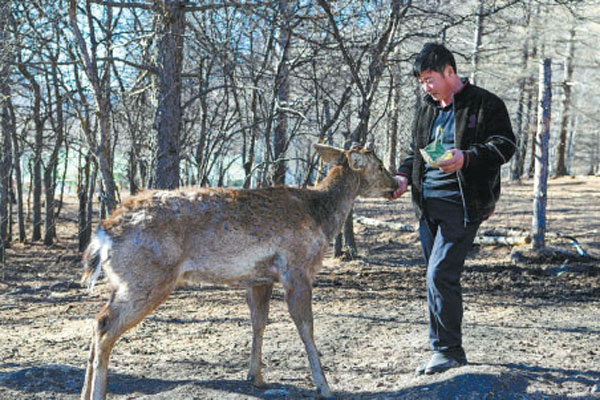Green revolution sees county blossom

A tourist feeds a deer in
Bailang township, Inner Mongolia autonomous region, in April.[Photo by Li Yunping/Xinhua]
The lumber industry was once the pillar of Arxan, a county in the Inner Mongolia autonomous region, where it was common for two and even three generations of local families to be involved in the sector.
The country is now promoting environmental protection, though, so logging was banned in 2012. However, instead of damaging the local economy, the ban has opened a new chapter for green development.
In addition to tourism, the city has gained fresh development impetus from animal husbandry and eco- industries.
The new development mode, which has protection of the rich forest resources at its core, has helped Arxan shed its status as a national poverty-stricken area, making it a successful example of the maxim that "lucid waters and lush mountains are valuable assets".
Yu Jiujiang, a resident of Arxan's Bailang township, is one of those who put away his logging tools and benefited from the development of local tourism.
Yu followed in his father's footsteps as a lumberman after graduating from junior high school in 1982. The tough times felling trees day after day are unforgettable.
"We left home for work before dawn and it was dark when we returned," the 57-year-old recalled.
The bitterly cold winter, which often saw temperatures plummet to -30 C, was the hardest time. "We worked as normal, even though the snow was so thick that our legs were entirely buried," said the businessman, who also works for the State-owned Bailang Forest Farm.
With no machinery in the early days, the workers not only had to fell trees with simple handsaws, but also had to carry the logs for transportation on their shoulders, he said, displaying the calluses on his hands and the scars the logs have left on his shoulders and back.
Businesses
The logging quota became smaller as 2012 approached, so local authorities encouraged forest farm workers to start their own businesses.
Yu seized the opportunity and opened a stable to serve tourists, mainly during winter, when Bailing is covered by thick snow. In addition to horseback riding, he provides horse-drawn sled tours to entertain visitors.
He never expected his venture would be such a success. Business has soared markedly since President Xi Jinping visited Arxan in early 2014. During his visit, Xi praised the county, saying it is beautiful during all four seasons and expressing the hope that tourism will boom in the city.
Initially, Yu had about 100 customers a day during winter, but after Xi's visit, the number soared to 500 to 600. "There were so many customers that I was once even called out to work when I was enjoying (Chinese) New Year's Eve dinner," he recalled.
In 2017, he raised the number of horses at the stable to more than 100 to meet rising demand. Now, he hires at least five poverty-stricken residents if he and his family members are too busy to work at the stables.
In addition to taking care of his business, Yu works as a ranger for the forest farm, looking out for illegal logging and forest fires. As rangers usually have little to do during winter, the jobs don't clash.
"My family can make up to 20,000 yuan ($2,830) a year," he said.
Diversification
While Yu relies mainly on his stables, Ren Hongmei, a Bailang resident and former lumberwoman, runs several businesses, thanks to rising tourist numbers.
In 2003, Ren's family was one of 40 households who moved into a newly established deer village to raise the animals. Together, they run at least five businesses.
While planting jelly ear, a type of edible fungus, and tree seedlings for sale, Ren also runs a 14-bedroom rural resort that can accommodate up to 40 people, plus a shop that sells local specialties such as powdered deer antler, a popular traditional Chinese medicine, jelly ear and wild mushrooms.
She and her family invested 800,000 yuan in the resort in 2014, more than 60 percent of which came from a zero-interest loan provided by the local government.
All the bedrooms in her resort are booked for a minimum of 10 days during summer and the establishment is also full during celebrations, such as the seven-day National Day Holiday, which starts on Oct 1 every year.
While she finds it difficult to calculate the exact income generated by all her businesses, Ren said her family makes about 100,000 yuan a year.
"Life has improved a lot," she said.
In addition to providing antlers, which are culled annually and sell for 3,000 yuan per kilogram, and other byproducts, the deer play an important role in attracting tourists.
Zheng Xiaolin, the village head, said his deer farm attracted more than 20,000 tourists last winter. He hires up to 16 residents from poverty-stricken families to help care for his 100-plus deer and serve the tourists, who can interact with the gentle animals and buy food, such as corn, to feed them.
The farm charges an admission fee of 50 yuan per adult during the peak winter season and 30 yuan at all other times. The business generates annual revenue of 100,000 to 200,000 yuan, Zheng said.
"I was once a poorly-paid lumberman, just like the other residents. After logging was banned, many people chose to make a living as migrant workers in urban areas. However, the tourism boom has seen many people return, and some have become managers at resorts and other businesses. Our income is much higher than before," he said.
Microcosm
Most families in the township, which has a population of about 2,000, undertake tourism-related work, according to local authorities.
Bailang is a microcosm of Arxan, where 60 percent of the 68,000 population work in the tourist industry, said Bai Feng, head of the Arxan tourism administration.
Residents used to herd sheep and cattle, but now they raise stags and does and have also started fish farms, all of which serve the tourism sector.
The combination of tourism with agriculture and animal husbandry has not only raised incomes, but has also helped to preserve the local greenery, Bai said.
In 2002, long before the logging ban, the local government prohibited herding to protect the local flora.
From 2014 to last year, Arxan saw both tourism revenue and tourist numbers more than double. Last year, the county received about 4.3 million tourists and tourism revenue stood at 5.3 billion yuan, according to the county government.
The residents' annual per capita disposable income rose at an average of 9 percent over the same period, reaching 27,981 yuan last year.
In 2011, Arxan was listed as a national poverty-stricken area, but it was removed from the list in April.
Gao Wei, the deputy mayor, said the county is building up an industrial pattern supported mainly by tourism and supplemented by eco-industries, agriculture and animal husbandry with local characteristics.
Rather than taking from nature, the local government has invested more than 1 billion yuan to promote environmental improvements.
While planting 20,000 hectares of trees, it also undertook measures to prevent soil erosion on nearly 15,000 hectares of land, Gao said.
Thanks to those efforts, the green coverage rate has reached 95 percent and the forest coverage rate stands at more than 80 percent, according to the government.
Arxan has been listed as a national exemplary county for the promotion of environmental progress.
Philosophy
Han Yongwei, a researcher with the Chinese Research Academy of Environmental Sciences who has visited Arxan, said the county stresses the philosophy of "environment first and green development".
"The practices in Arxan fully illustrate that there can be positive interaction between environmental protection and socioeconomic development, and a good environment can provide a foundation for economic development," he said.
As Arxan heads into another winter, the rumble of engines has been disturbing the silence of the forest-encompassed Bailang.
Excavators have been digging up the streets to prepare for pipelines to be laid to provide heat, because without adequate heating the local resorts will not attract many tourists during winter.
"Now, the government is building concentrated heating supply facilities to welcome visitors during the coming cold period," said Li Mingqiang, a logger's son whose family opened Bailang's first rural resort in 2006.
"Lay down the ax to serve the tourists, you won't have to worry that you will not lead a well-off life," the 31-year-old said.



 Print
Print Mail
Mail





